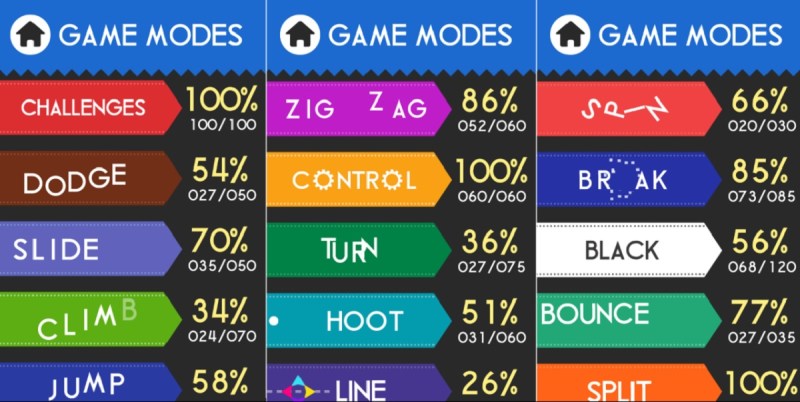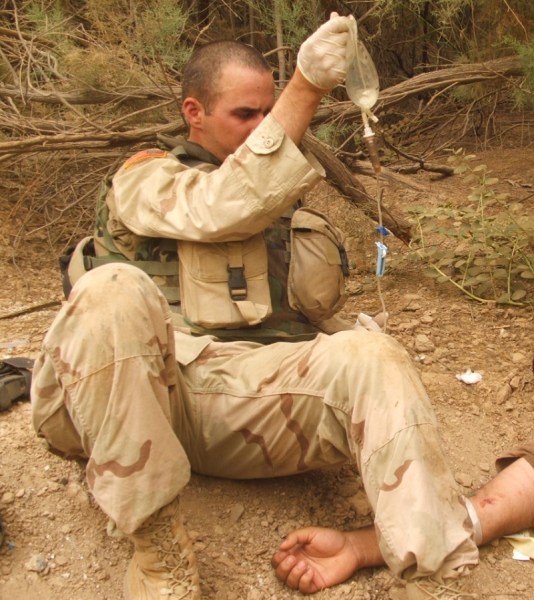I put all those in front of me and I used Thinkertoys techniques to take them apart into their attributes. There were a few common things I saw in all four of those. One was the idea of color switching. In Super Mario Bros. you get the flower, your outfit changes colors, and you can spit fireballs. Uno has the wild card that changes the color you can place on the deck. Simon has the color switching pattern you have to memorize, and it gets more elaborate as you play. Pac-Man, you get the big power pellet and the ghosts change colors. That lets you know you can eat them.
I put that down, and then other things—they all have around four colors. Most of them have a black background. There were other key elements. I had all of these attributes that–again, when I tore all these ideas apart and found these attributes and put them together—sometimes your brain conceptually blends things without having to even think about it. I remember color switching, four colors, dark background, all that in front of me on paper, and then unconsciously I just blended them.
I saw this rotating circle above my head made of four colors and I thought, “Well, what if I had a ball that had to go through a certain color?” One thought leads to another. Maybe it has to change every time. By using those techniques, tearing those ideas apart and putting them back together in a new configuration, and making the color switch element the main theme of the game, that’s how I came up with it.
GamesBeat: That’s pretty elaborate. A lot more than just, “I thought of something one day.”
Reichelt: Even when people say they just thought of something, that’s still conceptual blending. They’re just not doing it consciously. Like I said, even in that moment, I didn’t 100 percent consciously come up with it. It’s just that when I put those in front of me, my brain did it. We’re taking in information all the time. When you talk with someone, you blend their thoughts with your own. If you go to a museum or read a book—sometimes those thoughts just naturally come to you without having to think about it, but their tools you can specifically use and get better at using to be more in control of the ideas you think of, rather than just waiting for something to pop into your head.
GamesBeat: Have you had a chance to talk with other game developers about that process? Does it seem like this conceptual blending is a well-known thing?
Reichelt: It’s actually a very little-known thing. I went to Jesse Schell’s school and talked to his students, and I don’t think anyone there knew about it. I’ve talked to different audiences. To me, again, it’s the foundation of what everything in the universe is built on. It’s the core of creativity. Yet so many people aren’t aware of it.
A lot of people think they’re not creative. When people are aware of how simple it can be, and how you can really be as creative as you want to be, it’s very empowering. I have talked to other game designers. I’ve talked to some schools, high schools, grade schools, and shared these tools that I learned along the way from books and other things.
That’s one of the best side effects of having this game be a success. When you talk to kids, all of them are playing this game. They’re ready to listen to what you have to say. I like to share with kids this idea that they can learn from their failures. They can be as creative as they want if they work at it. If you have an idea of where you’d like your life to go, what everyone might think is a pipe dream isn’t at all. It might take some effort to get there, but you can accomplish something if you use these techniques consistently over time.

Above: David Reichelt parked cars as a valet attendant while making games.
GamesBeat: Were there other things that were interesting parts of the learning process in making Color Switch?
Reichelt: One thing was to look outside of your industry. Often the idea you need lies way outside of what you’re studying. That’s why it’s good to study everything, a little bit of—you don’t have to be an expert in everything, but you should educate yourself on a variety of topics you can pull from.
My background as a magician was what got me on the right track to even think of Color Switch. When I perform a magic trick, I know how powerful surprise can be in the presentation of the trick, and how powerful it can be to get a reaction from people. I wanted to make a game that surprises people all the time. From that thought, well, how about if I have a character that’s always changing? That turned into a ball that always changes color, but before I got to that specific theme, it was my experience as a magician and wanting to surprise people and putting that into a game.
It’s not just about looking at what everyone else is doing in your industry. It’s about looking outside of that for inspiration. If you ever hear Steven Spielberg talk about filmmaking, he says that if you want to be a great director, you want to watch every film from the silent era until now, because there’s something to learn from every one of them. When I started watching a lot of older films, I would see shots that Spielberg does today. You could see that he had studied and taken something and used it in a different way.
Always looking for inspiration from a variety of sources, always having the mindset of being a student—no matter how much success I may have with this game, I’m always telling myself in the back of my mind that I don’t really know much about games, so I’d better keep studying. By being a continual student, you’re always going to improve your thought process. If you do that, you’ll always improve what you do, and therefore improve the results you get.
That goes back to—there’s the famous quote about insanity. Doing the same thing and expecting a different result. The one key piece that people miss is that you have to keep putting new information into your brain. Then your actions will change and you won’t do the same things. Being a constant student, no matter what happens in your life, will always give you new and better opportunities over time.
One last thing would be, just being willing to fail. I realized that by being willing to fail, without any limitations, is how I got to my game. Between game 40 and game 41, which was Color Switch, there was a year’s time. I just got frustrated. I decided to take a break and rethink this whole thing. But I never gave up. That was never an option. If I had given up, I would never have known that the next one would be the one that would allow me to do this full time.
Once you’ve found what you’re passionate about—if you’re not passionate about something, there’s no way to succeed at it, because you won’t put in the time and effort to improve and become proficient at what you do. By being passionate about something and being willing to fail as many times as it takes, you set yourself up for success.

Above: Color Switch crossed 100 million downloads a while ago.
GamesBeat: How did Color Switch go to market? How did Fortafy come into the picture?
Reichelt: From my experience of making games, I knew that I didn’t know much about marketing. Color Switch was the first time I made a game where I couldn’t stop playing it. I think I played it for four hours the first time I put it on my phone. I knew I had something here.
I started shopping around. I didn’t know much about the industry. I was just making games in my apartment. I’d joined a forum, buildbox.com, and I posted to the other forum members, “Hey, I think I’ve made a game that could do well. Does anybody know any publishers I could contact that, how I could go about that?” My buddy Colin, another Buildbox developer based in Canada, said, “Yeah, I know a guy named Zeb you can show that to.”
I found this guy Zeb, Zeb Jaffer, on Facebook and messaged him. I’d made a trailer. I used to study film editing, so I could make my own videos and trailers for things. I showed him a trailer and he said, “I see games every day at this company, and this game, I’m telling you, we can get this to number one.” At first he helped me shop it around to different publishers, trying to be a middleman, but none of them were interested in Color Switch. He told me that he and his friend were going to start up their own company, Fortafy Games, later in the year, and if I was willing to wait I could publish with them.
I made the game back in June 2015, and I might have shown it to him as early as July. It was five or six months before we launched it with them, and everything happened after that.
GamesBeat: It’s way past—is it 200 million downloads now? Where is it now?
Reichelt: We were at about 200 million. Recently the game went off the app store, back in December. I had a two-year licensing deal with Fortafy Games, and I had the option to either continue it or to just go my own way. I decided that now I could afford to have my own studio. I had a lot of ideas that wanted to do with the brand and the game. I wanted to be more in control of that. I decided to go my own way. They had it on their account and they decided to take it off.
I had to have my team rebuild it, which we’re mostly done with now. We’re doing a lot of new things with the game. We’re putting up an improved version of what we had before. I believe we’re launching next month sometime.
GamesBeat: Right now, is there no way for people to play it unless they already downloaded?
Reichelt: Right. If they have it on their phones, they’ll have it there. There are tons of clones on the app store, and we’re always taking those down. Come April we have a pretty massive marketing campaign we’re going to be doing. We’ve had a lot of fans reaching out and asking where the game is, when it’s going to be back.
At first it was kind of a scary thing. A product that everyone knows does not usually go off the market for such a long time. But I actually think it’s going to work out well. We’re not worried about putting up the exact same thing. A lot of the ideas I had for the sequel I was going to do, I’m just putting them in this game. A lot of feature requests, a lot of game modes I was holding off on until I had my own team to make it. We’re launching with a lot of those modes.
The great thing about the game is it’s so minimalist. Unlike, say, Angry Birds—they were so specific with the cartoon bird characters. It’s harder to stretch that into different things. We’re as minimalist as you can get, just shapes and colors. We’re able to reinvent that in an infinite number of ways. We have a backlog of, I think, 40 mini-games that I’ve developed. We’ll come out with those every month. We’ll launch with four or five mini-games, and most of them are new.
It’s a chance to put all these new improvements in the game. Even though people may have lost their progress with the old version, we’re not just giving them the same content. They won’t be disappointed unlocking the same stuff. We’re giving mostly new content, aside from the core game, which is what became popular in the first place before we even had mini-games. We’re focused on all this new content and a lot of features that people have requested.

Above: David Reichelt had to save lives in Iraq as a medic.
GamesBeat: That’s an unusual feature of your contract, that it expired. I don’t usually see that happen.
Reichelt: I couldn’t say—they’re the only company I ever did a contract with. I literally came from cleaning swimming pools to all of a sudden I have a publishing deal with a game company. I had no prior experience, and to this day—I do contracts for my company with other artists and so on for other things, music and whatnot, but—that’s just how it ended up being. It was two years, and then auto-renewal or I would let them know ahead of time if I wanted to not continue it.
Fortafy has come out with three other games, I think, but none of them have had the same success as Color Switch. It goes back to a book I read by William Goldman, the screenwriter. A studio actor needs an A-list actor, but that actor needs a studio too. You need a marketing machine, but you also need a great product.
After I made all these games I knew I’d made something I thought was great. Fortunately other people thought so too when we published it. They had just formed that company, and I think I was the second game they had. They had Thug Worm, and then we did this, and it blew up from people sharing it and tweeting about it and so on. Then we just stayed on the top of the app store charts for two years. That’s where we’re focused on getting back to after we launch. It’s exciting to finally get it back out there.
GamesBeat: From your share of this, can you characterize how well you’ve done? Did it make you a million, millions, tens of millions of dollars? I don’t really have a clue as to what level this is at.
Reichelt: It definitely enabled me to do this full time and hire—I think I have about seven employees now, so I can fund all that. I’m reinvesting a lot of my money right back into the company. I know that I have a product that not only I think is great, but I talk directly with a lot of other game companies who are interesting in combining their characters with my IP, and we’re going to be doing that later in the year. I can’t say who that is yet, because nothing’s official.
We’re not just putting the game back out there as it was. We’re doing a lot of things with partners now. This is a different situation, because we now have a proven product, a worldwide success with longevity. We’re able to come to the table and get all these really fun and exciting deals with different partners, ranging from other game companies, getting the game in places that didn’t have it before—it’s pretty exciting to redo all of this. We have a lot of stuff happening with music.
We’re also expanding on what Color Switch is as a brand. I think we have five or six planned titles outside of this game, but all under the Color Switch brand, all different types of gameplay. I’ve had various merchandise ideas ever since soon after the game came out. Now we’re finally exploring those. It was important for me to be control of this IP I created, so I held off on a lot of those things until the time was right. One thing you learn as a medic is patience. I’ve been patient, and now this is the year where a lot of that is going to happen.

